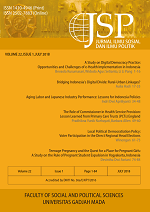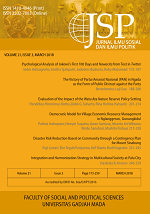“Living by Others”: Work Performance and Basic Need Fulfillment Among Women Farmworkers
Anggaunitakiranantika Anggaunitakiranantika(1*)
(1) Department of Women Studies, Ewha Woman’s University Seoul, Republic of Korea
(*) Corresponding Author
Abstract
This article explores Indonesian women who work as farmworkers, whose lives depend on working on other people’s agricultural land. The income earned by the women farmworkers is not high since female farm work is a seasonal job in agriculture. This research was conducted in Banyuwangi Regency as one of the largest farming areas in East Java Province, Indonesia, using a qualitative method with a phenomenological approach. Purposive sampling is a chosen technique in this research, involving ten women farmworkers, a farmworker spouse, and two landlords. Combining Scott’s subsistence ethics and existentialist feminism by Beauvoir, the research found that the work performed by women in East Java, Indonesia is a form of women’s existentialism that is carried out by experiential knowledge in working capabilities, constructing equality and gender roles through the men-women division of labor, and strengthening women farmworkers identification through work. Furthermore, women farmworkers make various efforts to fulfill their basic needs as their subsistence ethics. They utilize various side jobs that they can still do, reducing expenses and being owed by relatives, neighbors, and rice field owners in their hometown.
Keywords
Full Text:
PDFReferences
Anggaunitakiranantika, A. (2018). Konstruksi Sosial Pekerja Perempuan dan Anak pada Industri Perikanan. Sawwa: Jurnal Studi Gender, 13(1), 45-66. https://doi. org/10.21580/sa.v13i1.2216
Asih, I. D. (2014). Fenomena Husserl: Sebuah Cara "Kembali ke Fenomena". Jurnal Keperawatan Indonesia, 9(2), 85-90. https:// doi.org/10.7454/jki.v9i2.164
Carrier, J. G. (2018). Moral economy: What’s in a name. Anthropological Theory, 18(1), 18-35. https://doi.org/10.1177/1463499617735259
Creswell, J. W., & Creswell, J. D. (2018). Research Design: Qualitative, Quantitative, and Mixed Methods Approaches. New York: SAGE Publications, Inc.
De Beauvoir, S. (2014). The second sex. London: Routledge. https://doi.org/10.4324/9781315840154-29
Dharmawan, A. H. (2007). Sistem Penghidupan dan Nafkah Pedesaan: Pandang an Sosiologi Nafkah (Livelihood Sociology) Mazhab Barat dan Mazhab Bogor. Sodality: Jurnal Sosiologi Pedesaan, 1(2), 167-192. https://doi.org/10.22500/sodality.v1i2.5932
Dinas Pertanian Kabupaten Banyuwangi. (2017). Rencana Strategis Dinas Pertanian Kabupaten Banyuwangi 2016-2021. Retrieved from http://dinaspertanian.banyuwangikab. go.id/doc/RENSTRA_GABUNGAN_ DINAS_PERTANIAN_2016-2020_-_Copy_ini_(hotel_lanjutan_sip).doc
Gianawati, N. (2013). Strategi Bertahan Hidup Buruh Tani Perempuan . Yogyakarta: Pandiva Buku.
Haryono, T. (2005). STRATEGI KELANGSUNGAN HIDUP NELAYAN. Studi tentang diversifikasi pekerjaan keluarga nelayan sebagai salah satu strategi dalam mempertahank an kel angsungan hi dup (Airlangga University). Retrieved from http://skp.unair.ac.id/repository/jurnal_ pdf/jurnal_1352.pdf
ILO, Moser, C., & ILO. (1998). Unit 1: A conceptual framework for gender analysis and planning. Geneva: International Labour Organization.
Indroyono, P., Suyatna, H., Santosa, A., Wibowo, I. A., & Firdaus, R. S. M. (2018). Democratic Model for Village Economic Resource Management in Nglanggeran, Gunungkidul. Jurnal Ilmu Sosial Dan Ilmu Politik, 21(3), 215-230. https://doi. org/10.22146/jsp.28738
Jaggar, A. M. (2019). Women Working. In Jaggar A.M (eds) Living with Contradictions Controversies in Feminist Social Ethics (pp. 53-61). USA, San Francisco: Westview Press. https://doi.org/10.4324/9780429499142-6
Karami, E ., & M ans oorabad i, A . (2008). Sustainable agricultural attitudes and behaviors: A gender analysis of Iranian farmers. Environment, Development, and Sustainability, 10(6), 883-898. https://doi. org/10.1007/s10668-007-9090-7
Kim, K.-P. (2020). Domination and Resistance: The Power Theory of James Scott. Social Integration Research, 1(2), 127-136. https://doi.org/10.46907/jbs.2020.1.2.127
Kiranantika, A., & Habibah, R. N. (2020). Parenting System And Working Interest among Rural Adolescents: A Trends in Social Mobilization. Journal of Talent Development and Excellence, 12(1), 5389–5400.
Mies, M., & Shiva, V. (2021). People or Population: Towards a New Ecology of Reproduction. In Mies, M., & Shiva, V (eds). Ecofeminism (pp. 277-296). UK, London: Bloomsburg. https://doi. org/10.5040/9781350219786.ch-019
Nindito, S. (2013). Fenomenologi Alfred Schutz: Studi tentang Konstruksi Makna dan Realitas dalam Ilmu Sosial. Jurnal Ilmu Komunikasi, 2(1), 79-94. https://doi. org/10.24002/jik.v2i1.254
Obayelu, A. E., Ogbe, A. O., & Edewor, S. E. (2020). Gender gaps and female labor participation in agriculture in Nigeria. African Journal of Economic and Management Studies, 11(2), 285-300. https://doi.org/10.1108/AJEMS-03-2019-0128
Odini, S. (2014). Access to and Use of Agricultural Information by Small Scale Women Farmers In Support of Efforts to Attain Food Security in Vihiga County, Kenya. Journal of Emerging Trends in Economics and Management Sciences (JETEMS), 5(2),80-86.
Poloma, M. M. (2010). Sosiologi Kontemporer. Jakarta: Raja Grafindo Persada.
Puspitarini, D., & Femilia, P. S. (2018). Relasi Gender dan Kehidupan Sosial Ekonomi dalam Keluarga Buruh Tani Perempuan di Kecamatan Panti Kabupaten Jember. An-Nisa’, 11(2), 117-144. https://doi. org/10.35719/ansa.v11i2.778
Ritzer, G. (2012). Teori Sosiologi: Dari Sosiologi Klasik Sampai Perkembangan Terakhir Postmodern. Yogyakarta: Pustaka Pelajar.
Ritzer, G., & Goodman, D. (2006). Postmodern Social Theory. In Ritzer, G., & Goodman, D (pp. 289-347). Handbook of Sociological Theory . USA, New York: SAGE Publications. https://doi.org/10.1007/0-387-36274-6_8
Rossier, R. and Wyss, B. (2007), "Gendered interest and motivation of the younger generation in agriculture and farm succession", Asztalos Morell, I. and Bock, B.B. (Ed.) Gender Regimes, Citizen Participation and Rural Restructuring (Research in Rural Sociology and Development, Vol. 13, pp. 193-216), UK, Bingley: Emerald Group Publishing Limited. https://doi.org/10.1016/S1057-1922(07)13008-0
Sajogyo, P. (2002). Sosiologi Pedesaan. Yogyakarta: Gadjah Mada University Press.
Scott, J. C. (2005). Afterword to “Moral Economies, State Spaces, and Categorical Violence.” American Anthropologist , 107(3), 395-402. https://doi.org/10.1525/aa.2005.107.3.395
Setiawan, E. (2017). Konstruksi Sosial Pembagian Kerja Dan Pengupahan Buruh Tani. YINYANG: Jurnal Studi Islam, Gender Dan Anak, 12(1), 19-34. https://doi. org/10.24090/yinyang.v12i1.2017.pp19-34
Shortall, S. (2002). Gendered agricultural and rural restructuring: A case study of Northern Ireland. Sociologia Ruralis, 42(2),160-175. https://doi.org/10.1111/1467-9523.00208
Sollund, R. (2015). M. Mies and V. Shiva, Ecofeminism. State Crime Journal, 4(1),99-104.
Tong, R. (2018). F emi nist thought: Amore com prehensive introduction. London: Routledge. https://doi.org/10.4324/9780429493836
Trauger, A. (2004). “Because they can do the work”: Women farmers in sustainable agriculture in Pennsylvania, USA. Gender, Place, and Culture, 11(2), 289-307. https:// doi.org/10.1080/0966369042000218491
Valdivia, C., & Gilles, J. (2001). Gender and resource management: Households and groups, strategies and transitions. Agriculture and Human Values, 18(1), 5-9. https://doi.org/10.1023/A:1007608717996
Article Metrics
Refbacks
- There are currently no refbacks.
Copyright (c) 2022 Jurnal Ilmu Sosial dan Ilmu Politik

This work is licensed under a Creative Commons Attribution-NonCommercial-NoDerivatives 4.0 International License.






















